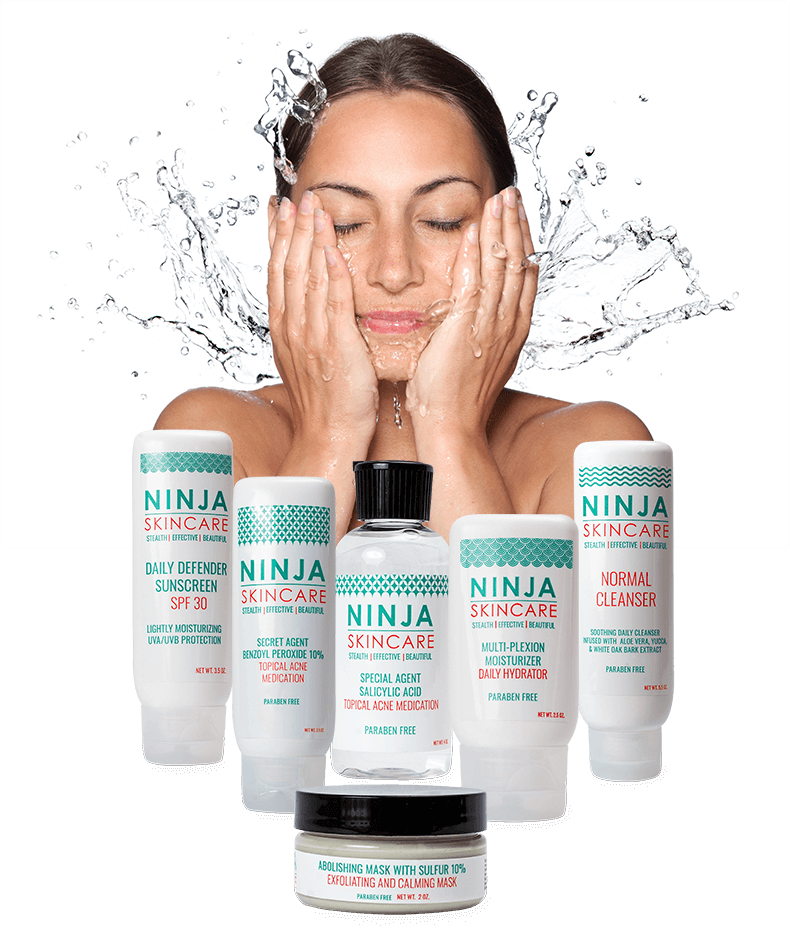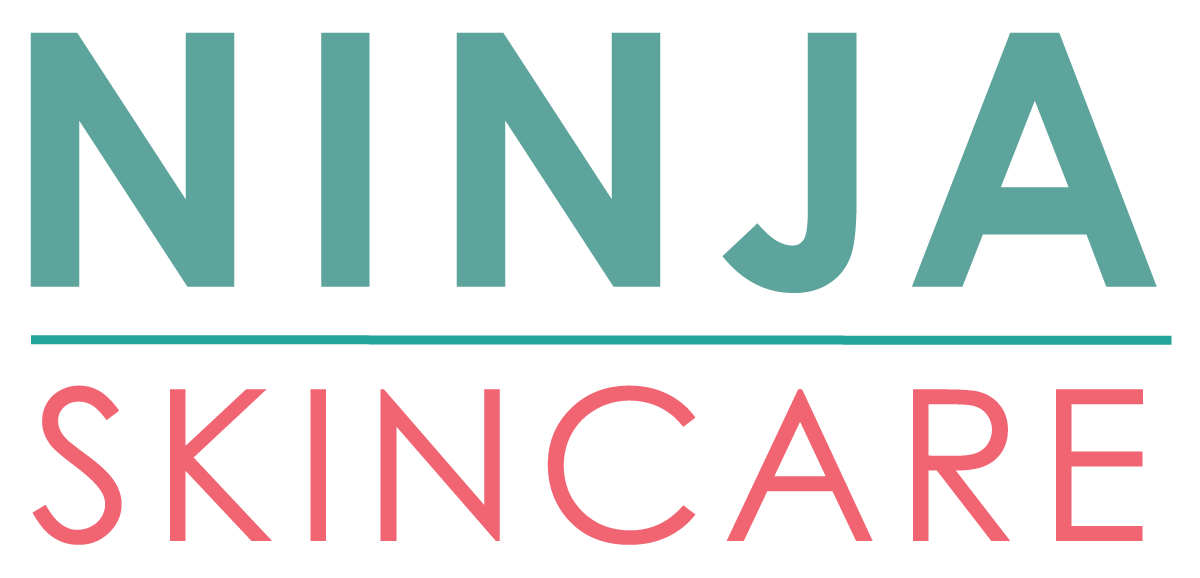What is Acne? Acne Facts.
What is acne? Who gets acne? How does acne form? What aggravates acne? We have honest and truthful answers to your many questions about what is acne and more.
ac·ne, noun: the occurrence of inflamed or infected sebaceous glands in the skin; in particular, a condition characterized by red pimples on the face, back and body.
Below is a picture of a normal Pilosebaceous Unit which in common language is a hair follicle with associated oil glands. It’s good to see what a healthy, unclogged hair follicle looks like so you will understand what acne is once we describe and show it to you.

How does Acne Form?
Acne forms in the hair follicle, not the sweat (sudoriferous) pore. The hair follicle is a small opening in the skin and typically has two sebaceous (oil producing) glands that produce sebum (oil). Normally, the dead skin cells that line the hair follicle walls will detach and the sebum carries the dead skin cells to surface of the skin where you wash them off with soap and water.
However, when the dead skin cells do not detach from the hair follicle lining and there is an increase of waxy sebum, a plug of oil and dead skin cells form. This plug is a fantastic place for bacteria to live and they will move down into the hair follicle canal. Your body is NOT ok with this! It wants to fight off the intruding bacteria so your body will produce localized heat and it will send in white blood cells and lymph. Your body’s immune system responds by producing a pimple. The entire process of forming a pimple may take up to 4-5 months! Egads!! Who knew!?
Types of Acne
The most common forms of acne are whiteheads and blackheads. The basic acne lesion, called the comedo (KOM-e-do), is simply an enlarged and clogged hair follicle. If the comedo stays beneath the skin, it is called a closed comedo and produces a white bump called a whitehead.

A comedo that reaches the surface of the skin and opens up is called an open comedo or blackhead because it looks black on the skin’s surface. This black discoloration is caused from changes in sebum as it is exposed to air. It is not from dirt! Both whiteheads and blackheads may stay in the skin for a long time.

Other types of troublesome acne:
- Papules. Inflamed lesions that usually appear as small, pink bumps on the skin and can be tender to the touch.
- Pustules (pimples). Papules topped by white or yellow pus-filled lesions that may be red at the base.
- Nodules. Large, painful, solid lesions that are lodged deep within the skin.
- Cysts. Deep, painful, pus-filled lesions that may cause permanent indentations and scarring.
Who Gets Acne?
Acne is the most common skin disease and affects all races and ages of people. I bet you didn’t know that acne affects nearly 80% of people at some point during their lifetime, most commonly between the ages of 10 to 35.
Contrary to popular belief, many individuals do not outgrow their tendency to breakout. Usually, the older you get, the more your flare-ups become less severe. Regardless, acne is still unwanted and often embarrassing. Most acne sufferers go between times of flare-ups and clear skin their entire lives.
What Causes Acne?
There are many factors that cause a person to have acne, but the most common is genetics. The predisposition to retain dead skin cells in the hair follicles is an inherited trait, just as your eye, hair and skin color.
The other two primary factors that cause acne are significant changes and surges in hormone levels, such as during pregnancy and the teenage years and certain types of medication.
What Aggravates Acne?
The list of possible acne aggravators is extensive, so we’ve highlighted several of the most common factors that make acne breakouts worse. Thankfully many of these are easy to avoid or reduce.
- Stress – You knew it was going to top our list! When you’re stressed, your body produces excess hormones, especially cortisol and adrenaline. These hormones make your oil glands produce thicker and waxier oils, leading to more clogging in the hair follicles. This creates new pimples to form. Also, stress decreases your natural ability to fight infections so bacteria are able to flourish and pimples typically get larger and more numerous.
- Types of stress include:
- Unhealthy diet
- Dehydration
- Lack of sleep
- Smoking
- Taking drugs
- Too much alcohol and/or caffeine
- Unhealthy lifestyle
- Types of stress include:
- Clogging Oils – Using cleansers, makeups, moisturizers and other skin products that contain clogging oils will only make acne worse. Unfortunately, consumers can not trust products, even those currently marketed to clear acne prone skin, because the labeling of non comedogenic (non-acne aggravating) and/or oil free is not regulated by the FDA. In fact the only thing that’s truly ‘oil-free’ is water! The good news is there are many oils that do not clog your skin, but unfortunately they are not widely used.
- Hormones – Hormones are secreted through the oil glands in the hair follicles. Certain hormones produce extremely sticky and irritating oils which cause more clogging.
- Sun Exposure – If your skin turns color when in the sun, it is being damaged. Yes, even a brown tan! This damage causes your skin to overproduce skin cells to protect and repair the damage from the sun. Consequently, when the increased number of skin cells die off, they get clogged more easily in the hair follicles and cause more pimples to form for the future. There is no such thing as a safe tan!
- Poor Hygiene – Bacteria flourish in accumulated oils on the skin, so wash your skin at least twice a day and after exercising and sweating.
- Squeezing and Picking – Exerting too much pressure on a pimple or blackhead will force the infection to go deeper into the skin and that increases the risk of making the pimple much larger.
How is Acne Treated?
TOPICAL MEDICATIONS: (Ninja Skincare’s specialty since 1989!)
There are several common active ingredients that are used in topical acne medications. Each works a little differently, but most aim to exfoliate dead skin cells that cause clogged hair follicles. Following are the most common ones:
- Benzoyl peroxide. Kills the bacteria, P. acnes, detaches dead skin cells in the hair follicles and may also reduce oil production
- Sulfur. Unclogs pores, reduces inflammation and kills bacteria
- Resorcinol. Acts as an antiseptic to clear existing blemishes more quickly
- Salicylic and Glycolic Acids. Help break down blackheads and whiteheads by topical exfoliation. Also assist in the shedding of cells lining the hair follicles
Topical medicines are available in many forms, such as gels, lotions, creams, soaps, or pads. For some people, they may cause side effects such as skin irritation, burning, or redness, which often will get better or go away with continued use of the medicine. If you experience severe or prolonged side effects, discontinue use and report back to your practitioner.
In order for topical medications to be effective, you must use them daily to prevent new pimples from forming. If you skip applications, you are allowing new pimples to form for the future. It typically takes up to 4 weeks to see positive changes on the skin.
PRESCRIPTION MEDICATIONS:
There are a wide variety of oral and topical prescription medications used to treat acne. Here is a list of the most commonly prescribed medications for acne prone skin:
- Oral and Topical Antibiotics. Help stop or slow the growth of bacteria and reduce inflammation
- Topical Vitamin A derivatives (retinoids, like Retin-A). Unplug existing comedones. Some may also help decrease the formation of comedones. These drugs contain an altered form of vitamin A.
- Isotretinoin (Accutane). A very potent oral drug used to treat severe acne patients. Shrinks sebaceous glands, and slows the production of oils which reduces bacteria growth in the hair follicles and topically.
How to Care for Acne Prone Skin?
Clean Skin Regularly
Wash your skin with a non acne aggravating cleanser and rinse thoroughly, once in the morning and once in the evening, as well as after heavy exercise and perspiring.
Use fingertips or a soft facial sponge to cleanse. Using rough scrub pads is not helpful and may actually make the problem worse by irritating and damaging the skin.
Avoid Messing with Pimples
Avoid rubbing and touching skin lesions. Squeezing, pinching or picking blemishes can lead to the development of scars or dark blotches and increase the size of breakouts.
Avoid the Sun
Suntans and sunburns cause damage to the skin and makes the skin produce excessive amounts of skin cells, which die off and get clogged in the hair follicles; thereby producing more pimples for the future.
Choose Proven Anti-Acne Skincare Products
This is where NinjaSkincare.com has you covered! No clogging oils, no irritating ingredients and all specially formulated for your skin type to prevent new pimples from forming. Since 1989.
What is Acne? Truthful answers to your important questions from licensed estheticians at Ninja Skincare, Inc.
Diagrams courtesy of the National Institute of Health


